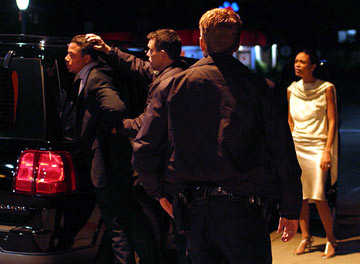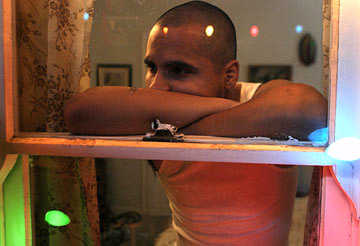

A few years ago, Canadian Paul Haggis was the victim of a carjacking in Los Angeles. This experience served as the genesis for Crash, an ensemble film that examines racism in its various facets. If people were unfamiliar with LA before watching Crash, they would probably go away thinking that the city was populated with bigots and is a melting pot boiling over with barely repressed rage. It's definitely a provocative movie, and the actors do well, but the script is thin and feels too artificial at times. In order to get his point across, many of the characters become two-dimensional. They are stereotypes with just enough depth to muddy the waters; Haggis (who adapted Million Dollar Baby) and co-writer Robert Moresco (One Eyed King) want to make things less clear. They introduce characters who seem black and white, then reveal a little about their circumstances, causing the audience to feel sympathy for them. Is it good to feel sympathy for a vicious racist?
Crash begins almost playfully, with two black men, Anthony (Chris "Ludacris" Bridges, 2 Fast, 2 Furious, The Wash) and Peter (Larenz Tate, A Man Apart, Biker Boyz) arguing about racism in America. Anthony's theories grow increasingly implausible, yet he ardently believes that people treat him differently because of his skin color. Despite some of the comedy surrounding their banter, Anthony and Peter are articulate. So then they carjack Rick (Brendan Fraser, Looney Tunes: Back in Action, The Quiet American) and his wife Jean (Sandra Bullock, Miss Congeniality 2, Two Weeks Notice), leaving Jean a mess. They change the locks on their house, but once Jean notices that the locksmith has a shaved head and tattoos, automatically assumes that he is a gang member and begins a vicious diatribe. Daniel (Michael Pena, The United States of Leland, Buffalo Soldiers) is not a gang member, but a hardworking father who moved to a better community so his daughter would feel safer. Still, she sleeps underneath her bed, afraid of bullets.
Graham (Don Cheadle, The Assassination of Richard Nixon, Hotel Rwanda) and Ria (Jennifer Esposito, Taxi, Breakin' All the Rules) are detectives who are also seeing each other. Cheadle has a narrative at the beginning about how Angelinos are disconnected with each other, hiding behind glass walls. This causes an increase in the amount of distrust between them, so when they do meet they literally 'crash' into each other looking for a connection. Sounds good, but he also spews vitriol about Ria's race, and Ria, who rear ends a Korean woman, lets loose with more racial epithets. Officer Ryan (Matt Dillon, City of Ghosts, Deuce's Wild) pulls over Cameron (Terrence Howard, Ray, Biker Boyz) and his wife Christine (The Chronicles of Riddick, The Truth About Charlie). After it is clear that they are not the people he was originally looking for, he still forces them out of their car, and molests Christine while Terrence and Ryan's partner Hanson (Ryan Phillippe, Igby Goes Down, Gosford Park) watch helplessly.
The characters run into each other and deal with what happened to them. Terrence feels completely emasculated and ashamed, while Christine feels betrayed. Hanson wants to transfer, but is unsure whether to remain silent, which would lead to Ryan staying on the job. Jean continues to freefall emotionally, and Graham neglects his over-medicated mother and absent brother. Ryan deals tenderly with his ailing father, while additional mistrust festers between Daniel and Persian storeowner Farhad (Shaun Toub, Land of Plenty, Maryam). Haggis raises some very provocative issues that will get people talking, but tries to cram in too much. Everybody is a shade of gray, so much to the point where Crash feels too manufactured. The point was to show how racism affects everybody differently, and Haggis wanted to paint a broad picture. Given the running time, there are too many characters, as some feel hastily slapped together, especially the Asian ones.
This should not detract from the performances. It says a lot when other actors outshine Cheadle, but this is the case here. The standouts are Dillon and Pena. Dillon is great at playing an ass (almost too good), but when the script forces him to reexamine his beliefs, he adds depth to his character. Pena is just as good. Daniel is the opposite of what everybody thinks he is. He displays a tremendous amount of love and tenderness to his family, and gives an especially strong performance in a late scene with Toub. One gets the sense that Toub and Pena channeled some actual frustration into their roles, since Latinos and Persians (and Arabs) are typically portrayed stereotypically. Howard is great as a man who feels boxed in by societal constraints. He is not the type of person to speak out, so he internalizes everything instead. He looks like he is about to explode, both in anger and sadness, but has no idea how to. Bridges is intensely charismatic, and Bullock, usually annoying, is highly effective in as Jean. It's too bad the script did not match the level of acting. If it did, then Crash would have really been good.